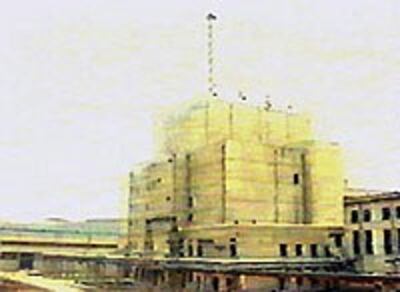
SEOUL—North Korea says it has finished extracting spent nuclear fuel rods from a reactor, allowing it to harvest more weapons-grade plutonium and “bolster its nuclear arsenal.”
According to a North Korean Foreign Ministry statement carried by the official KCNA news agency, Pyongyang has “successfully finished” removing 8,000 fuel rods from the reactor at its Yongbyon nuclear complex, which was shut down last month.
Removing the rods would allow them to be reprocessed to produce weapons-grade plutonium, amid an escalating standoff between North Korea and the United States. North Korea evicted international nuclear inspectors in late 2002, making it impossible to verify the claim.
China urges restraint
Saying the United States had "threatened the DPRK [North Korea] with nuclear weapons," the North Korean statement said Pyongyang "keeps taking necessary measures to bolster its nuclear arsenal for the defensive purpose of coping with the prevailing situation, with a main emphasis on developing the self-reliant nuclear power industry."
In Beijing, China urged restraint from all parties to six-way talks on North Korea's nuclear aims.
"We ask all the parties to exercise restraint and we hope that they will do nothing that is detrimental to the resumption of the six-party talks," Foreign Ministry spokesman Liu Jianchao told Reuters.
Analysts say reprocessing the spent rods could yield enough plutonium for five to eight nuclear bombs, depending on the weapon design. To get the plutonium, the rods would first need to cool for several months.
U.S. says Pyongyang preparing nuclear test
Six-nation talks aimed at getting Pyongyang to give up its nuclear ambitions have been stalled since June, with Pyongyang insisting it won't return until Washington drops its “hostile” policy. North Korea says the United States is planning an invasion, which Washington denies.
Also Wednesday, U.S. Ambassador to Japan Thomas Schieffer confirmed that North Korea appeared to have begun preparations for a nuclear test.
"I believe they have taken some preparatory steps," the Associated Press quoted the newly appointed envoy as saying in Tokyo at a meeting with a Japanese ruling coalition leader.
We ask all the parties to exercise restraint and we hope that they will do nothing that is detrimental to the resumption of the six-party talks.
U.S. officials said last week that spy satellites show activity in northeastern Kilju, such as tunneling and the building of a reviewing stand, that could indicate plans for North Korean nuclear test.
Enough for 'five or six bombs'
On Tuesday, North Korea's leading newspaper, Rodong Sinmun, accused the United States of making a "fuss" by spreading reports of alleged test preparations. But it didn't deny that Pyongyang was planning a test.
In an interview with RFA's Korean service, International Atomic Energy Agency (IAEA) spokesman Mark Gwozdecky said North Korea possessed at least 8,000 spent fuel rods, or enough for five or six nuclear bombs.
"We had inspectors at Yongbyon for almost 10 years monitoring the freeze and knew the quantity of spent fuel that was contained in the reactor there," Gwozdecky said.
'Wrong direction'
"We knew they had 8,000 spent fuel rods. And we don't know if they have more than that, but we know that in 8,000 there is approximately five or six nuclear bombs' worth of plutonium."
In Washington, the Bush administration said Wednesday that North Korea was headed in the "wrong direction" in negotiations on its nuclear arms program and again brandished the threat of possible U.N. sanctions.
The State Department also renewed its call on China to exercise "robust diplomacy" to bring North Korea back to six-party talks despite Beijing's reported resistance to punitive pressure on Pyongyang.
"We see rhetoric, claims, statements, activities, whatever, by North Korea that go in the wrong direction," said State Department spokesman Richard Boucher. "It's time for them to stop isolating themselves, for them to realize that they need to come back to the talks and be constructive."
Boucher reiterated that if North Korea continued to shun the talks with the United States, China, Japan, South Korea, and Russia, the matter could end up before the United Nations.
We see rhetoric, claims, statements, activities, whatever, by North Korea that go in the wrong direction...It's time for them to stop isolating themselves, for them to realize that they need to come back to the talks and be constructive.
"The Security Council can and will, if necessary, take up some of these issues," he said, adding: "That is, again, not necessarily the best way to solve them."
But Beijing has balked at taking tough action against its East Asian neighbor, with a foreign ministry spokesman quoted as saying Tuesday that the country opposed any "strong-arm tactics."
The Chinese also reportedly rebuffed Washington's request to cut oil supplies to North Korea.
